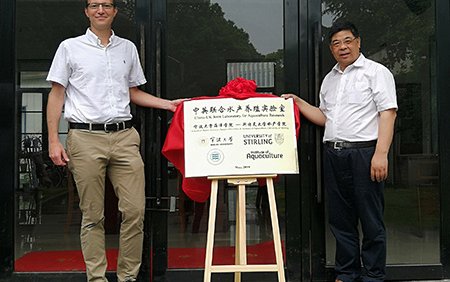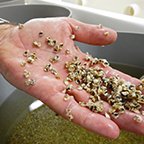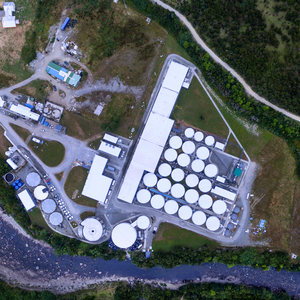A new agreement between the Universities of Stirling and Ningbo, in China, will see aquaculture staff and students share knowledge and collaborate on research and teaching projects.
Stirling’s Institute of Aquaculture and Ningbo’s School of Marine Sciences officially launched the new partnership, after signing a Memorandum of Understanding last year.
The agreement was signed by Professor Herve Migaud, Head of the Breeding and Stock Improvement Research group at the Institute, and Professor Chun-Lin Wang, Dean of the School of Marine Sciences and Head of the Genetic Research group at Ningbo.
In addition, Professor Migaud has been appointed Distinguished Professor by the Zhejiang Province, under its Thousand Talents Plan, which will see him collaborate on developing research and teaching activities over the next three years.
He said: “I am delighted by the opportunity to develop a long-term partnership between Stirling and Ningbo on aquaculture research and training, and address some of the main global food security challenges faced by a growing human population.
“This is an honor to have been selected and awarded by the Zhejiang Province’s Thousand Talents Plan and offered the opportunity to engage with colleagues at Ningbo.
“This award is a great opportunity to connect, innovate and transform as it aims to develop a deep and mutually-beneficial partnership with Ningbo and its partners in China, the first aquaculture producer in the world, through new innovative teaching courses and research programs in a region of the globe where food security, resilience and sustainability have never been so critical.”
Professor Wang said: “Food security is the common goal for people all over the world. As a food source, aquatic products provide nutritious high-quality proteins for human consumption, and aquaculture is making an increasing contribution to global food security.
“The establishment of a joint laboratory for aquaculture by the two institutes in China and the United Kingdom will not only promote academic exchanges between the two sides, but also support the sustainable development of the aquaculture industry.”
The research element of the collaboration will initially focus on breeding, genetic improvement, nutrition and health of commercially important aquaculture species in the Zhejiang province including the swimming crab, large yellow croaker, pomfret and cuttlefish.
Staff and student exchange will play an important role in this collaboration. Dr Ronghua Li, Associate Professor in Professor Wang’s research group, was awarded a year-long fellowship by the China Scholarship Council to visit Stirling to work in Professor Migaud’s group.
China, and the Zhejiang Province specifically, is a major contributor to the success of the aquaculture industry, with many aquatic species being farmed on a large scale. However, many challenges still need to be addressed to meet the increasing demand for seafood.
The collaboration is timely as, this summer, the School of Marine Sciences at Ningbo is moving to a new modern campus on an island just outside of the city. Similarly, the announcement comes days after the Institute of Aquaculture was allocated £17 million to develop a new facility under the Stirling and Clackmannanshire City Region Deal, supported by UK and Scottish Government funding.













